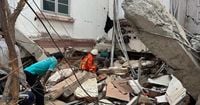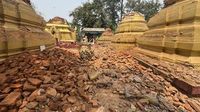A powerful earthquake struck Southeast Asia on March 28, 2025, causing widespread devastation and loss of life across the region. With a magnitude of 7.7, the earthquake's epicenter was located near Sagaing, Myanmar, approximately 16 kilometers northwest of the city. The tremors were felt in several neighboring countries, including Thailand and as far away as southern China, leading to a state of emergency being declared in both Thailand and Myanmar.
Initial reports indicate that at least 144 people have died and over 700 have been injured in Myanmar alone, where the damage has been particularly severe. The ruling junta in Myanmar has called for international aid, highlighting the gravity of the situation. In Thailand, the collapse of a thirty-story building under construction in Bangkok has resulted in at least three fatalities, with around 81 workers still unaccounted for in the rubble.
The earthquake struck at approximately 2:20 PM local time (5:20 AM French time), and was followed by a significant aftershock with a magnitude of 6.4 just minutes later. Eyewitness accounts from both countries describe scenes of chaos and panic as people rushed to evacuate buildings and seek safety. In Bangkok, many reported feeling the ground shake violently, prompting a rush to the streets.
Sunan Kenkiat, a 31-year-old worker at the construction site of the collapsed building in Bangkok, recounted his experience during the quake. "It was shaking, and I felt dizzy. After that, debris started falling, and the shaking intensified, so I shouted for everyone to run," he told CNN. He described the atmosphere as chaotic, with dust and debris filling the air.
In Myanmar, the situation is dire, especially in the areas closest to the epicenter. Reports from hospitals indicate that many injured individuals are being treated in makeshift conditions due to the damage sustained during the quake. An official from a major hospital in Naypyidaw stated, "So far, about twenty people have died after arriving at our hospital. Many people have been injured," emphasizing the urgent need for medical assistance.
The World Health Organization (WHO) has activated its emergency management system and is coordinating efforts to provide aid to the affected regions. Margaret Harris, a spokesperson for the WHO, noted, "We consider this a huge event that poses a significant threat to lives and health." The organization is mobilizing supplies from its logistics center in Dubai to assist those injured in the quake.
In Bangkok, the Thai Prime Minister has declared a state of emergency, while the vice-prime minister, Phumtham Wechayachai, confirmed the three deaths and the ongoing search for the missing workers. "We are mobilizing rescue teams to find those trapped in the rubble," he stated during a press conference. The building that collapsed was located near the popular Chatuchak market, a busy area frequented by both locals and tourists.
As the day progressed, the death toll continued to rise in Myanmar, with the junta reporting at least 144 fatalities and 732 injuries. The extent of the destruction has led to widespread power outages and disrupted communications in several regions, particularly in Mandalay and Sagaing, where many buildings have been reported as damaged or destroyed.
In a rare move, the Myanmar junta has appealed for international assistance, indicating the severity of the disaster. Prime Minister Narendra Modi of India expressed solidarity, stating that India is ready to provide any necessary assistance to both Myanmar and Thailand. "We pray for the safety and health of all," he said.
Images and videos shared on social media show significant destruction, with streets littered with debris and rescue workers in orange suits searching for survivors. Eyewitnesses reported hearing explosions as electrical systems failed and buildings crumbled. Many residents in Bangkok described the experience as terrifying, with one individual stating, "I thought I had sea sickness before realizing what was happening. We hid under tables. It was the first time in my life I felt such a strong tremor."
As the region grapples with the immediate aftermath of the earthquake, authorities are assessing the damage and coordinating rescue efforts. The Thai government has suspended all metro lines in the capital until inspections can be completed, while emergency services are stretched thin as they respond to the needs of the injured and displaced.
The earthquake is a stark reminder of the region's vulnerability to seismic activity. Despite being situated in a seismically active zone, both Thailand and Myanmar have rarely experienced quakes of such magnitude, and their infrastructure is not always equipped to handle such disasters. Building codes in these countries are less stringent compared to those in Japan, where earthquakes are more frequent and destructive.
As rescue operations continue, the focus remains on finding survivors and providing aid to those affected. The international community is watching closely, ready to respond to the humanitarian needs arising from this devastating event. The full impact of the earthquake on the economies and lives of those in the affected regions is yet to be determined, but initial assessments suggest that the repercussions will be felt for a long time to come.





